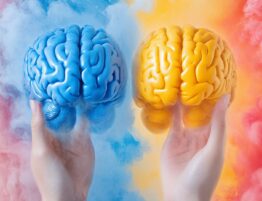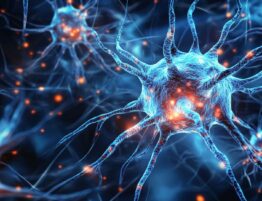Good mental health is essential for a fulfilling life. In today’s world, maintaining positive mental health can be challenging, especially with the growing influence of social media. The popularity of social media grows every day. Many people struggle to use social media in healthy ways. This can negatively impact emotional well-being. Digital platforms also present complex mental challenges. The constant exposure to curated content likes and notifications can trigger emotional responses.
Research shows that social platforms can influence brain activity. They significantly impact reward processing, decision-making, and emotional regulation areas. Positive interactions are supportive comments. They can boost mood and self-esteem. At the same time, negative experiences, like cyberbullying or comparison, may harm mental health. They lead to stress, depression, or decreased self-worth.
This dual impact underscores the importance of understanding how digital media affects people. We explore its benefits and challenges. Let’s explore strategies to harness digital communication as a connection and well-being tool. We mitigate potential risks to emotional and cognitive health.
Understanding Social Media’s Psychological Impact
Social media is significant in shaping our mental well-being. It offers positive and negative influences on emotional health. The impact of constant social media use depends on how you use platforms. The nature of online experiences also influences this aspect. Let’s discuss the positive psychological impact:
- Access to Resources: Platforms provide instant access to mental wellness tips. These include coping strategies and access to professional services.
- Self-Expression: Social media offer creative outlets for sharing thoughts, ideas, and personal stories. They boost self-esteem.
- Awareness and Advocacy: Campaigns on social media help raise awareness about mental health issues. They reduce stigma and encourage open conversations.
- Support Communities: These forums enable people to connect with others facing similar challenges. Online support communities foster a sense of belonging.
Now, we will discuss the adverse effects of social platforms:
- Comparison and Envy: The curated content on digital media often leads to unrealistic comparisons. They affect self-image and confidence.
- Stress from Overuse: Excessive online time can disrupt daily routines. It contributes to screen fatigue and reduced productivity.
- Anxiety and Depression: Negative interactions, cyberbullying, or exposure to distressing content are dangerous. They can worsen feelings of anxiety and depression.
Users must recognize the psychological impact of social platforms. Individuals can adopt healthier habits. They amplify its benefits and maintain risks to mental health.
Positive Effects on Emotional Well-Being
Digital media has the potential to enhance mental well-being. It helps build meaningful connections and provides avenues for emotional support. When used mindfully, platforms can significantly contribute to emotional well-being.
How do social platforms positively impact emotional well-being? Let’s explore:
- Building Connections: Digital media bridges geographical gaps. They help individuals stay connected with friends and family. These connections strengthen relationships and reduce feelings of isolation.
- Access to 24/7 Support: Platforms offer many support groups and communities. Users can share experiences and seek advice and solidarity in challenging times.
- Promoting Belonging: Engaging in like-minded groups or niche communities is important. It can create a sense of acceptance and shared purpose. This boosts mental health.
- Encouraging Self-Expression: Digital media provides creative outlets for expressing thoughts, emotions, and ideas. It enhances self-esteem and personal satisfaction.
- Raising Awareness: Users may share stories about mental health journeys. They help reduce stigma and foster open, supportive conversations about emotional challenges.
- Spreading Positivity: Positive campaigns, uplifting content, and affirmations inspire optimism and gratitude. They contribute to overall emotional well-being.
Challenges in Mental Health Management
The rapid growth of digital media has introduced various challenges. They significantly impact mental wellness. These platforms can significantly affect our mental health, leading to stress, anxiety, and other emotional challenges. Here are some of the key challenges:
- Unrealistic Comparisons: Digital media often showcases idealized versions of others’ lives. It leads individuals to make unrealistic comparisons. This can negatively impact mental health. It causes feelings of inadequacy, anxiety, and depression. People feel they don’t measure up to these curated images.
- Addictive Nature of Social Platforms: There is a constant need for validation through likes, shares, and comments. It can create addictive patterns. They disrupt real-life connections and contribute to mental health issues. They include social isolation, anxiety, and reduced attention spans.
- Fear of Missing Out (FOMO): Continuous exposure to others’ activities can induce it. FOMO leads to feelings of loneliness and anxiety. People may feel left out or less accomplished in comparison to the constant updates they see.
- Sleep Disruption: The overuse of digital communication is a widespread situation. This is dangerous, especially late at night. It disrupts sleep patterns. This lack of rest can exacerbate symptoms of stress, anxiety, and depression. They further harm mental health.
The psychological effect of these issues is dangerous. It highlights the complex relationship between social platforms use and mental health. Such an effect emphasizes the need for healthier digital habits and greater awareness of its effects.
How Social Media Shapes Brain Function
The rise of social platforms has profound effects on brain function. It influences everything from attention span to memory. This impacts even the brain’s reward systems. Here’s how digital media shapes its function:
- Impact on Attention Span: Social platforms have fast-paced nature. It encourages rapid information processing and multitasking. This can reduce the attention span of the brain’s ability to focus on one task for an extended period. This constant switching between posts and notifications lead to difficulties with sustained attention.
- Rewiring Neural Pathways: Constant engagement with social media can lead to the rewiring of the brain’s reward centers. The frequent use of likes, comments, and shares triggers the release of dopamine. It reinforces behaviors and creates habits similar to those associated with addiction.
- Memory and Cognitive Load: The high volume of information consumed on digital media can overload working memory. This makes it harder for the brain to retain and organize information. Some studies suggest that exposure to new, engaging content may enhance memory. It often comes at the cost of deep, reflective thinking.
Social platforms affect brain function. Understanding these effects is crucial for navigating the digital world in a healthy way.
The Role of Social Media in Emotional Well-Being
Social platforms significantly shape emotional well-being. They offer benefits and challenges. Here’s how it impacts mental wellness:
- 24/7 Support Communities: Facebook and Instagram offer these groups. There, people can share experiences, advice, and encouragement. It helps to reduce feelings of loneliness and stress.
- Positive Connections: Social media provides a platform for forming meaningful connections. It is also generally used for maintaining relationships. They can foster a sense of belonging and support.
- Cyberbullying: Negative interactions include online harassment. They can significantly harm emotional health. It leads to distress and mental health challenges.
- Boosting Self-Expression: Sharing personal achievements, creative work, or thoughts can enhance self-esteem. It also provides validation. This contributes positively to emotional well-being.
Balancing Social Media Use for Better Mental Health
Maintaining a healthy relationship with digital communication is crucial for supporting mental health. Here are actionable strategies for balanced social platforms use:
- Set Time Limits: Establish daily limits for social media use to prevent overconsumption. Use tools or apps to track your screen time and create boundaries to protect your time and mental well-being.
- Curate Your Feed: Follow accounts that promote positivity, support, and personal growth. Unfollow or mute content that triggers negative emotions or stress. It can impact your mental health.
- Turn Off Notifications: Disable non-essential notifications to reduce distractions. Minimize the impact of constant digital engagement on your brain function.
- Practice Mindful Usage: Be aware of how social media affects your mood and emotions. Take breaks to reflect on whether it’s contributing to or detracting from your well-being.
- Engage in Face-to-Face Communication: Prioritize real-world interactions to maintain a healthy social life. It can boost mental health and improve brain function.
Follow these strategies. They will help you create a more balanced and mindful approach to digital communication.
Future Perspectives: Social Media’s Evolving Role in Mental Health and Brain Function
Digital media continues to evolve. Its role in psychological and brain health is also shifting. Emerging trends are exploring ways to enhance emotional well-being. They mitigate the negative effects:
- Artificial Intelligence (AI)-Powered Emotional Support: Innovations in creating more personalized systems. AI chatbots and psychological mental health apps are offering immediate, accessible support. It provides coping strategies and emotional guidance to users.
- Mental health Monitoring Tools: Emerging platforms are integrating features that track health indicators. They include mood monitoring and stress levels. These tools allow users to check their mental well-being. Individuals also may receive tailored resources for improving mental well-being.
- Therapeutic Social Communities: More platforms are facilitating online support groups and communities where individuals can share experiences and access professional health resources. These spaces promote healing and reduce isolation.
- Neuroscientific Research into Digital Media’s Impact: Ongoing studies are exploring their effects. They include its influence on attention and emotional regulation. This research aims to guide healthier digital engagement.
- Digital Detox Initiatives: New campaigns and apps encourage them. These initiatives help prevent the negative impacts of social media on brain function. They promote healthier consumption patterns.
Social media is becoming increasingly connected to mental healthcare. These innovations may offer valuable tools for fostering emotional well-being. Contact us to get high-quality help.













Please, leave your review
Write a comment: